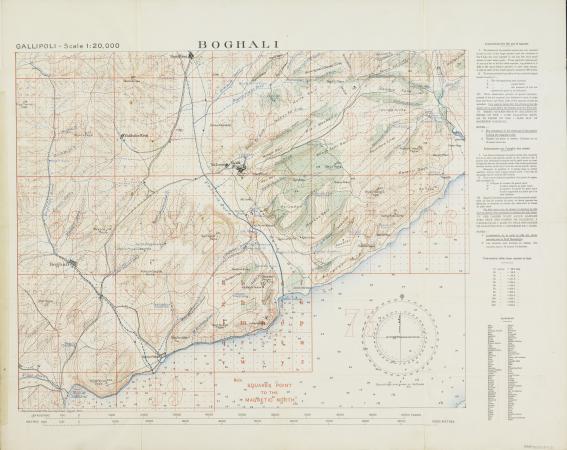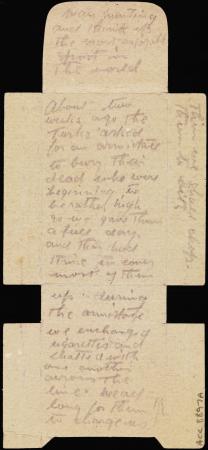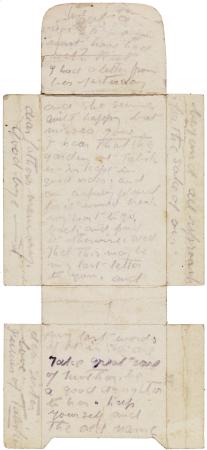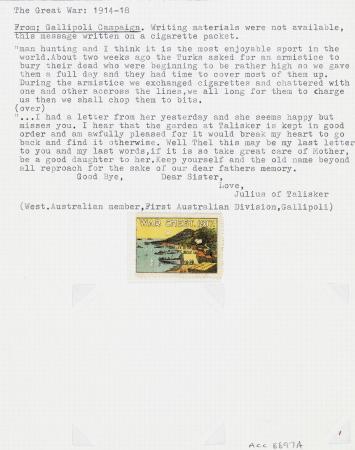Pete Edwards, Heritage Team Librarian, discusses original ANZAC materials from the State Library archives. From maps of the 1915 & 1917 battlefronts to letters written from Gallipoli, a desperate action at Gallipoli that ended in a Victoria Cross & a cigarette card, and snippets of one soldier’s story told via a series of postcards sent to his family on the home front. These archival materials may be old and fragile, but the stories they carry remain loud and strong, and call for quiet contemplation.
Access to these original ANZAC maps, letters, and postcards—and digitised copies of them—provide everyone with a direct if small window into the lived experience and stories of W.A. soldiers far from home. Pause and consider where they were as they wrote, what were they really thinking and feeling. How did they cope with the unforgiving realities of those times?
As we reflect on these fragments of our collective Western Australian story, consider how would you have coped, what would you have thought, and done, if you wore the muddied frontline shoes and boots worn by so many from 1914 - 1918?
Lest We Forget will always ring true as will—as Pete likes to say—Always Remember.
Here are links to digitised copies of ANZAC materials from Pete and Christine’s discussion:
- Map of Gallipoli - scale 1:20,000. Boghali. 1915
- Map of Gallipoli, c.1908 - 1915
- Trench map, Belgium [Ypres], 1917
- Letter [written on a cigarette packet] from Gallipoli written by Julius Farquhar Wallace MacLeod, June 1915.
- Bravest of the brave [cigarette card]: Captain Hugo Vivian Hope Throssell
- James Leslie Turner World War I postcards collection, 1915 - 1918
- Please search the catalogue using the terms WW1 Centenary Project to find many more ANZAC materials in the State Library collections.
For more stories from the State Library and the State Records Office, follow @statelibrarywa and @staterecordsofficewa on Facebook.
Recorded live on ABC Radio Perth on 23 April 2021.
Transcript
[Segment introduction. Male voice asking, “What is history?”]
[Suspense instrumental music in the background]
[Different voices saying “Nothing will save the Governor General... something revolving.... that’s one small step for... the world keeps revolving... just a little bit of history repeating, repeating, repeating....]
Christine: Yes, this is our weekly segment with the State Records Office (of WA) and the State Library (of WA) and today of course ahead of Anzac Day, we are going to talk about some very important pieces of history with Pete Edwards who is a librarian with the Heritage Team. Hello Pete.
Pete: Christine, how are you going?
Christine: Very well, thank you so much for coming into the studios for this. Ah, firstly, do you have any Anzac links yourself?
Pete: I do, I do. I have a Great Uncle, I believe who was at Gallipoli, survived that campaign and managed to get off the shore and have a troop ship torpedoed under him as far as I understand it and made it to France and had his elbow shot off, so...
Christine: [Gasp in shock]
Pete: He had his arm bent for most of his life apparently. Now, I only have a vague recollection of him because I was very young when he actually passed away.
Christine: [astonishment] Oh, yes, wow. Golly, from the elbow. That is quite something.
Pete: [Chuckles]
Christine: Ah, and you’ve been looking into this extensive collection, but you’ve found some pretty special things. Can we talk about the historic maps first that you’ve uncovered?
Pete: Ahhh, the maps, the maps.
The State Library (of WA) has an incredible collection of historic maps and just recently when I was thinking about Anzac Day, I was looking through the map collection thinking, “What can I find to do on Anzac Day” and low and behold I come across maps of Gallipoli dated and created at the time of the campaign.
Christine: [astonishment] Wow.
Pete: So 1915, some going a bit earlier of course which were created by the British War Office but I found these wonderful maps of the Peninsula and also another map, a wonderful trench map dated to the 1st of April 1917 for all of the trench systems around Ypres in Belgium where, as you will be aware, a whole pile of terrible fighting for a very, very long time. Incredible maps.
Christine: Who made these?
Pete: The maps were created by the geographical section of the British War Office for the most part. They have an ordinant survey as well and these two sections were responsible for creating the maps and this comes out most strongly I think when looking at the trench maps from Belgium because I had to continually update them so they were...the map we have that I came across recently and just recently had digitised so you can access this from our catalogue...
Christine: Ah great!
Pete: Ah, was correct to the 1st of April 1917 and as the lines moved, the (British) War Office was continually creating more of these maps, so they were accurate to the day to assist movements on the field.
Christine: Well, I suppose they would have been integral to...
Pete: Absolutely.
Christine: ...to the plans. What kind of condition are they in?
Pete: Well, they’re actually in very, very good condition. The Gallipoli maps are, you know they’ve been flattened for a very long time and so has the one of Belgium of course...of Ypres, however when you look at the map of Ypres, you can see that it was once was folded up into a very small rectangular shape so you can imagine it something that a soldier or a lorry driver would have kept inside his great coat, so as a reference point of...or an officer for that matter as well to stop if he needed to stop somewhere, he could look at these maps to go “what, where am I on the field? What’s around me? Are they craters? Are there mine fields? Are there barbed wire entanglements? All of those sorts of things as well as the standard things you’d see on a travel map. There’s this town, there’s that town, there’s this road, there’s railways, it’s really quite such an amazing resource to consider when you’re looking at 1st world war research.
Christine: Ten minutes past two, Pete Edwards is my guest from the State Library of WA. We’re talking about ANZAC relics. You have found a letter written on a cigarette packet signed Julius of Talisker.
Pete: Yes, Julius Farquhar Wallace MacLeod of Talisker. And I saw this and thought, “What is all this about?” and we have actually digitised this item as well and it’s an amazing story of...an amazing tiny little item but this little item that we have was hand-written by Julius in the trenches at Gallipoli, so...and I have the text of it here if you’d like me to read it...
Christine: [excited] Yes, what does it say? Tell me, tell me.
Pete: Ok, it doesn’t go too long but it says “Writing materials were not available. This message written on a cigarette packet. Man-hunting and I think it is the most enjoyable sport in the world. About two weeks ago the Turks asked for an armistice to bury their dead. We were beginning to get rather high so we gave them a full day and they had time to cover most of them up. During the armistice, we exchanged cigarettes and chatted with one another across the lines and we all longed for them to charge us then we shall chop them to bits.”
Christine: Wow!
Pete: And then on the other side, he goes on. This is mental gymnastics to my mind...“I had a letter from her (mum) yesterday and she seems happy but misses you.”
Pete: He is writing this letter to his sister Thel. “I hear that the garden at Talisker is kept in good order and I’m awfully pleased for it would break my heart to go back and find otherwise. Well Thel, this might be my last letter to you and my last words. Now if it is, so take great care of mother, be a good daughter to her, keep yourself and the old name beyond all reproach for the sake of our dear father’s memory. Goodbye dear sister, love Julius of Talisker.”
Christine: [astonishment] Wow
Pete: So he didn’t have any writing material. He had a little cigarette packet, it’s written in pencil, it is literally a tiny little item that we have very carefully housed and looked after...
Christine: He talks about a garden, his mum and then chopping people into pieces.
Pete: That’s it and the mental gymnastics there to go from talking about how wonderful it is to hunt men, to “How’s Mum going, I hope the garden is ok” and for me when I was reading this and just stopping to think about it, I thought, well, how do you do that? How do you get your mind around such dispirit concept and you know, but then that is the reality of the day. He’s there on the front line. He chose to go there and we have this wonderful letter which helps us get inside his mind at that point and that’s one of the wonderful things about these collections.
Christine: And you wouldn’t have many like that I would think, right?
Pete: Not many. Not like that. You know, there are diaries. We have many diaries of course and more and more of them are being digitised as we go along through time but this in particular encapsulates a way of thinking and it really echoed... you know there’s that famous quote by Ernest Hemingway.
Christine: Yes.
Pete: And Ernest was a veteran of the First World War as well you know so we have Julius there saying man hunting is one of the most enjoyable sports and you’ve got Ernest’s quote which is, “There’s no hunting like the hunting of a man and those who have hunted armed men long enough and liked it never care for anything else thereafter.” [makes shivering sound]
Christine: [makes shivering sound] Yes.
Pete: It just gives me a bit of a chill just thinking about it. But you can’t help but wonder since they had shared experiences if this is where those concepts or that way of thinking was born or and also there’s the reality that they must have enjoyed it.
Christine: Yes, I suppose yes, only they could truly tell us and Julius has. It’s nearly a quarter past two. With me is Pete Edwards from the State Library of WA. I’m keeping a very close eye on the clock, and a very close eye on our line for the press conference which is due from the premier. The moment it starts I will put it live to air for you. Don’t you worry, it’s coming.
Let’s see if we can sneak in a chat about the bravest of the brave. Captain Hugo Vivian Hope Throssell who was a WA farmer and I know the Throssell name still thrives here.
Pete: Yes. Yep. Captain Throssell, he earned a VC at Gallipoli for an action that he took on Hill 60, I think it was on the 29th August and what had happened was he and his troops had stormed forward to take a section of line on Hill 60 and they’d gone into the trench and he took a great deal of action, killed a number of Turkish soldiers and then what opened up for an entire night was what they call a bonfire. So effectively, they’re in a trench and they put up a barricade on one side of the barricade you have the Turkish defenders and then you have the Anzacs on the other side and what they were doing across this barricade was lobbying grenades at one another.
Christine: [astonishment] Wow.
Pete: So, this is one of those legendary things we all know about where they would...the grenade would land at their feet, they’d pick it up and throw it back before it goes off. So this went on all night on the 29th and 30th of August I believe it was and Hugo was wounded. He got bomb... he had like splinters of grenade in his forehead, face covered with blood but he wouldn’t move to the rear and he kept his men at the front, kept the fight going and across the night, they threw 3000 bombs so it was a deadly close quarters sort of action and before that action, there were successful in repulsing the Turks and keeping the trench my understanding is and he was awarded the VC (the Victoria Cross) for that action on that night.
Christine: [astonishment] Wow, which is one of the highest honours.
Pete: mmm…
Christine: That is huge.
Pete: That’s so true, yes.
Christine: And I suppose people are asking on the text line whether they can see these records. You’ve mentioned that many of them have been put on line. Where can they go and see them Pete? Where exactly are they?
Pete: Ok, so what anyone... anyone who wants to look at any of these digitised materials, they can go onto the State Library (of WA) website so slwa.wa.gov.au and you can do a search straight from the website in a search box at the top of the screen and that will take you into our library catalogue. Now it’s from there you can have access to the entire world of records that we keep at the State Library. Not everything is digitised but we’re getting there and the key things to remember; the Hugo Throssell cigarette card that we’re talking about now actually, that came apart about as a result of his VC action is online and so is Julius’ letter.
Christine: And James Leslie Turner’s World War 1 postcard collection. Let’s talk about that.
Pete: Yes. James Leslie Turner. He was a young man who went across and like so many documented everything in postcards and letters, and we have a fantastic collection of his entire tour whilst he was over in France, in Europe and it’s a massive collection of postcards from everywhere. They’re all the army issue ones and personal ones as well but... and the pictures on the front, yeah they’re great, they’re nice, we’ve seen them all before but it’s the back side of the card that matters because that is where the story is.
Christine: Yes.
Pete: And what we find in the story is that James’ telling us... and remember also these are fragments. All we get with many parts of history are fragments and we have to try and piece them together to come up with an accurate view of what really went on. But one story...I’ll just read a little bit of this card from the 7th July 1916. He says “Dear Dad, I hope this finds you in the best of health as it leaves me. We are out of the trenches and we have been on the wallaby somewhere in France.”
Pete: [confused] And I thought, “on the wallaby”? I haven’t heard this before. What does this mean “on the wallaby”?
Christine: [confused] On the wallaby?
Pete: So apparently, “on the wallaby” means you’re wondering about, having a good old time just looking for something to do. So you don’t actually have a job or anything to do. You’ve got a bit of free time and you’re having a scout about. So you’re ‘on the wallaby’.
Christine: On the wallaby.
Pete: Somewhere in France.
Christine: [Chuckles]
Pete: So these cards are really, really fascinating because I thought well firstly what’s ‘on the wallaby’ ok so it means wondering about. Then there are other cards where you get that flip like Julius says, “Yes, man hunting is great” and “How’s the garden at home?” and “Hope mum’s ok” which is a complete change of thinking I would have thought. He has similar sort of situation where he says “ ah you know, a shell lands near me” and he says, “Dear mum, you know, a shell landed near me and when they do, they leave a nasty taste in your mouth. Hope you are well.” [Chuckles] And I’m going, could you imagine being his mother receiving the card at home?
Christine: [Shock] Ah.
Pete: So, he’s just said that an artillery round has just gone off near him. It doesn’t taste good at all when the cordite is in the air I suppose.
Christine: Mmm.
Pete: And then he asked how you’re going. And that’s all that that lady would have been left with of that story... which she would have received that in the mail.
Christine: It would have been such a delay.
Pete: Incredible to consider the impact on the people at home as well as the people in the trenches on the line like James and we have many, many instances of these little accounts that James’ provides and also a key thing is when he was off to the scene of the quarrel he says, “I’m going back into the thickest of the fight” he says to his dad. He writes a whole series of cards which are, “Hope you are well, goodbye”. So it’s one of those things where you would write these cards thinking it could be their last and so there was a card for each person in the family and the end was always “Goodbye”. So it was one of those you know, a final goodbye, you may not hear from me again and then whatever would come, would come.
Christine: [astonishment] Wow! Twenty minutes past two, Pete Edwards is with me from the State Library of WA. We’re talking about some incredible items that are part of the State Libraries collection pertaining to Anzac Day. I wonder how you will be commemorating the day on Sunday, 0437 922 720.
Just a side-note, we did say that the Premier’s press conference was coming at 2.15pm. It has now been delayed to 2.30pm. It’s the 3rd time it has been delayed but I am getting lots of texts from you. Concerns about what the news could mean for you and your plans and I’m going to take you to that press conference the moment it starts.
And I have to say Pete, thank you for being so [chuckles] flexible with this this afternoon because you put an awful lot of research into this particular collection. How will you be spending Sunday? What will you be doing?
Pete: Well, I’m going to be spending it with a bit of quiet reflection in the morning. There’s nothing... you know the first thing in the morning, when dawn is breaking is the time to think about... it’s the time to think about what happened on Anzac Day over there in Gallipoli and every other conflict that Australia has been involved with over the years since, you know. It’s a hard reality but these things happen and it’s something that we need to... you know we all know the saying ‘lest we forget’ but something I always like to remind myself and another way of thinking about it is, instead of saying ‘lest we forget’, say ‘always remember’. ALWAYS REMEMBER because then we have the better chance of making sure the things that have happened previously don’t happen again.
Christine: I have seen that written more this year, yeah that’s a very good point. Well, Pete thank you so much for sharing this collection with us this afternoon. It’s been nice to catch up.
Pete: Likewise. Thank you very much.
Christine: That’s Pete Edwards from the State Library of WA Librarian with the Heritage Team. It’s twenty-two minutes past two. As he mentioned so many of the pieces are on their website.






